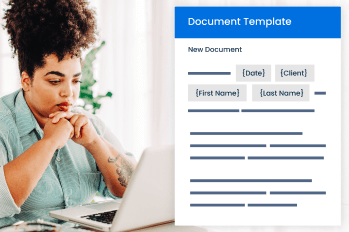As a personal injury lawyer, your daily routine involves juggling numerous tasks—from tracking down medical records to keeping clients well-informed and negotiating settlements. Having the right tools makes all the difference in securing the best outcomes, particularly when it comes to the intricate realm of workers’ compensation claims.
With an abundance of options, it can be daunting to know where to start. In this post, we’ve compiled a curated list of the best workers’ compensation claims management software for 2024. We also shine a light on key features that will transform how your firm handles workers’ compensation claims.
Key features of workers’ compensation management software
In today’s legal landscape, a multitude of software solutions exist to streamline the process of handling workers’ compensation claims. But how do you determine the right fit for your specific needs? To help you get started, we’ve outlined the key features of the best workers’ compensation claims management software in 2024 below.
Automated claim submission and processing
Automation is revolutionizing many aspects of the legal field—and workers’ compensation claims are no exception. The most impactful tools take over the heavy lifting of routine and time-consuming tasks, like gathering documents and details to use in document automation. This not only reduces the manual workload of personal injury lawyers, but also ensures consistency and minimizes the risk of errors.
Document management and storage

As any personal injury lawyer knows, workers’ compensation claims involve a wealth of documentation—making document management another key feature. A robust solution should offer a centralized platform that allows clients to effortlessly upload their documents and easily search and retrieve those documents for you.
Real-time communication and collaboration
Effective workers’ compensation claims management software enables both real-time and asynchronous communication and collaboration with colleagues and clients. The top tools facilitate the seamless exchange of information and allow for the sharing of documents, updates, and insights. In doing so, it boosts transparency and ultimately, contributes to the prompt resolution of workers’ compensation claims.
Benefits of using a workers’ compensation claims management software
From streamlining processes to driving efficiency, workers’ compensation claims management software offers numerous advantages to personal injury law firms. Here’s a closer look at some core benefits:
- Improved efficiency and productivity. By setting up automated workflows, personal injury lawyers no longer have to spend their valuable time on administrative work. Instead, they can focus on what matters. The result? Cases move forward, the claims process is expedited, and clients get paid faster.
- Enhanced accuracy and compliance. Workers’ compensation claims management software is specifically designed to ensure compliance with legal and regulatory requirements. This protects sensitive client information, reduces the risk of penalties, and prevents reputational damage to your firm.
- Cost savings and ROI. Automating tedious processes can help reduce administrative costs associated with compensation claims. By handling claims more effectively, compensation claims management software delivers a tangible return on investment.
Best workers’ compensation claims management software: our reviews
Clio
Clio is the world’s leading provider of cloud-based legal technology. From billing to trust accounting, Clio offers everything personal injury lawyers need to run their practice and seamlessly manage workers’ compensation claims. In late 2023, it launched a new end-to-end solution designed specifically to help personal injury lawyers handle the unique demands of this highly complex practice area.
Pros
- Centralizes every case detail in one place. With the ability to effortlessly organize medical records, bills, damages, and settlements in one centralized cloud-based platform, lawyers can quickly find the information they need. The outcome? They spend more time resolving cases, and less of it tracking down information.
- Automates tedious tasks. Clio automates the most tedious parts of making workers’ compensation claims. For instance, personal injury lawyers can automatically build case documents like complaints, create calendar events for key deadlines, and set important follow-up reminders—all in a few clicks.
- Removes the need for manual calculations. With Clio’s settlement calculator, you can make quick and informed decisions during negotiations by running multiple scenarios—helping to maximize client settlements.
- A secure, compliant solution. Compliance with all HIPAA regulations gives lawyers peace of mind in knowing that their clients’ sensitive data and confidential medical information are always protected.
Cons
- Certain integrations are only available in certain countries.
Smokeball
Created for and by lawyers, Smokeball is a cloud-based legal practice management software that helps manage many aspects of law firms.
Pros
- Automated time tracking. Whether creating documents or replying to emails, automatic time tracking ensures personal injury lawyers capture every minute worked.
- A centralized document repository. All documents, from medical records to insurance details, are automatically tagged to the related matter to help lawyers get the information they need at a glance.
- Communication capabilities. Smokeball’s Communicate client portal software makes the process of communicating with clients simple and secure—while also facilitating stronger collaboration among internal teams.
Cons
- High cost. With less flexibility and low-risk options to get started, Smokeball can be a more expensive option—especially for small firms.
CloudLex
CloudLex is a cloud-based software built exclusively for personal injury law firms that offers a variety of features to handle workers’ compensation claims.
Pros
- Efficient document management. CloudLex simplifies the process of capturing and managing documents, providing one single place to access settlement demands, negotiations, and more.
- Settlement calculator. With CloudLex’s settlement calculator, lawyers no longer have to rely on spreadsheets or physical calculators.
- Easy electronic signatures. CloudLex’s LexSign offers a simple way to send, sign, and track eSignatures within its legal software.
Cons
- More challenging to use. Users have reported barriers to using CloudLex’s interface, especially when it comes to workers’ compensation cases.
SmartAdvocate
SmartAdvocate is a fully integrated case management system designed by and for personal injury lawyers.
Pros
- Strong eSignature functionality. SmartAdvocate’s eSignature capabilities help personal injury lawyers get documents signed and claims submitted without a hitch.
- Quick document creation. Legal professionals can automate document assembly with 4,000 available merge codes and create necessary forms and submissions.
- A range of dashboards and reports. Dozens of dashboards and reports let legal professionals capture important case information.
Cons
- Poor user experience. Some users have claimed that the interface is not as intuitive as it could be and requires a steeper learning curve.
CoCounselor
CoCounselor is an advanced cloud-based practice management solution designed for the unique needs of personal injury firms.
Pros
- Access files from anywhere. CoCounselor lets personal injury lawyers easily create documents with a few quick clicks, while saving them in the cloud ensures they can be accessed no matter where you are.
- Get more done with automation. CoCounselor triggers automated task assignments, emails, calendar events, and more, so that lawyers can focus their time where it matters.
Cons
- Poor document management. Users have reported issues with not being able to store all documents on the platform.
Amicus
Founded over 20 years ago, Amicus is a practice management solution for legal professionals.
Pros
- Effective document management. Store an unlimited number of documents of any type to each case for quick and easy retrieval.
- Streamlined communications. An integrated dashboard delivers access to the entire work-related injury case, including all emails, notes, and documents.
Cons
- Lack of integrations. Users have mentioned challenges with third-party integrations.
- Cumbersome to use. Some have reported a clunky interface and significant learning curve, as well as challenges with customer support.
Filevine
Filevine is an all-in-one cloud-based legal system for plaintiff personal injury lawyers that’s designed to make managing cases easier.
Pros
- Real-time collaboration. Filevine’s collaboration tool, The VINE, lets lawyers easily share documents, assign tasks, and communicate with teams and clients, directly in the software.
- Easy search. Optical Character Recognition (OCR) accelerates the process of locating documents.
- Artificial intelligence capabilities. Filevine’s Demands.ai software streamlines workflows in personal injury cases, such as creating medical summaries. It also offers a new AI-powered tool to expedite legal intake launched last year.
Cons
- Poor functionality. Users have reported steep learning curves with Filevine.
Choosing the right workers’ compensation claims management software for your firm
The right workers’ compensation claims management software can significantly impact the success of your personal injury law practice. Selecting the right tool is crucial, and the following tips can guide you through the decision-making process:
- Consider ease of use. When assessing potential options, prioritize factors such as user-friendliness and seamless integration capabilities with your existing systems in the personal injury practice.
- Check the vendor’s track record. Request client testimonials and successful case studies from the vendor. Additionally, seek out online reviews and connect with other legal professionals to hear different perspectives on their experience.
- Prioritize game-changing features. Give priority to features that enhance efficiency, such as automated claims processing and real-time reporting. These functionalities not only boost productivity but also ensure the best possible client experience.
By carefully considering aspects like these, you’ll be more likely to choose a workers’ compensation claims management solution that best suits the unique needs of your firm.
Final thoughts on the best workers’ compensation management software
Whether you’re supporting a client with a slip and fall accident case or navigating medical malpractice, personal injury can be a highly demanding legal practice area to work in. Lawyers must juggle multiple moving parts at any given time, while also ensuring clients feel supported as they navigate difficult times of their lives. Fortunately, with the right workers’ compensation claims management software, they can save time, take on more cases, and scale their practice in 2024—and beyond.
What are the top workers’ compensation claims management software in 2024?
The best workers’ compensation claims management software solutions streamline case management, simplify document organization, and enhance collaboration among legal teams and clients—all while ensuring compliance with regulatory requirements.
What are the key benefits of using workers’ compensation claims management software?
Workers’ compensation claims management software offers several advantages, including streamlined document management, expedited claims processing, error reduction, and improved collaboration. These combined benefits contribute to a more effective overall management of claims and client experience.
Note: The information in this article applies only to US practices. This post is provided for informational purposes only. It does not constitute legal, business, or accounting advice.
Explore AI insights in our latest report
Our latest Legal Trends Report explores the shifting attitudes toward AI in the legal profession and the opportunities it brings for law firm billing, marketing, and more.
Read the report

